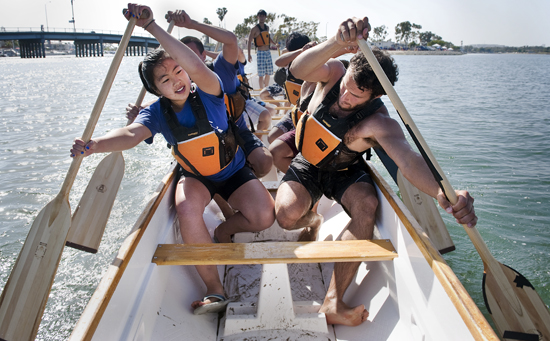If common folklore and legend have emphasized anything, it’s that the two most difficult things to tame are dragons and open water.
But the UCLA Dragon Boat team has utilized the former to conquer the latter. Armed with more than 50 members with energy, spirit and an unparalleled level of commitment, the 6-year-old club has established itself as one of the most competitive collegiate dragon boat teams around.
Originating from ancient Chinese traditions, dragon boats are long, narrow boats designed to mimic their mythical counterparts, with decorations like scaly dragon skins, tails and even heads. Each boat is occupied by a crew of 22, with 20 paddlers, a steersman and a drummer. Synchronization is crucial, because all members work in unison to power the boat through races ranging from 200-meter sprints to 2,000-meter endurance runs.
On Sunday, the UCLA team took its paddles to the Long Beach Spring Race, a local competition with divisions including elementary schools and independent clubs. The race had a few differences from standard dragon boat rules: Each boat was only allowed 18 paddlers, and each team was required to have at least six female participants. And while the competition consisted of just a handful of collegiate teams, UCLA deemed it imperative to send a message to the other teams.
“It’s a pretty small race, but it’s really important for the teams around here because it’s the only college race around this season,” said Shou-Long Leung, a fourth-year cognitive science student and the club’s president.
Though rival teams from California, UC San Diego and USC gave strong performances, UCLA swept the two collegiate events, the 200- and 500-meter races.
The UCLA Dragon Boat team prides itself on its members’ commitment to the sport, taking time out of their busy schedules to compete all across the country and against the world’s best.
“We just got back from a race in Tempe, Arizona,” Leung said. “(After this race) we are going to be training for the summer Long Beach race, which is an even bigger race with international and out-of-state teams.”
Another critical aspect of the team is its intense training regimen. Each week during race season, the team holds two land practices at Drake Stadium and two water practices at the Long Beach Marine Stadium. The long, strenuous workouts are evident in the members’ muscular backs and shoulders and their dark tans. In addition to mandatory practices, most members take the time to work out in the Wooden Center on free days.
“Sometimes we’ll go to the gym and see half our teammates there,” said Alex Yu, a third-year economics/international area studies student and next season’s president.
Yu said that each paddler has a different body type, something that is taken into consideration during training.
“The coaches will often write personal workouts for the members,” he said.
But these paddlers are not limited to Southern California locations for practices. Many of the team’s members hail from Northern California, so during the past winter break, about half of the team went to the Bay Area to train. The team also has members that have trained and competed in Canada and China.
Although the demanding workouts may seem apt only for veterans, the club does not require previous paddling experience from new members.
“We’ve had some great leaders (on the team) that have never picked up a paddle or been on a sports team,” Yu said.
However, the club does ask for a basic level of athleticism.
“We recruit from a very sports-specific perspective at the club sports jamboree,” Leung said. “We market ourselves as a really competitive sport, so that’s why when people come in, they come from a very athletic background.”
Greenhorn paddlers can learn quickly from experienced members and the ever-committed past
members.
“All alumni, since when the club started in 2004 to now, will help out when they can,” Leung said.
Even the club’s founder, alumnus Derrick Chan, helps out from time to time despite currently attending school in Boston.
“It’s nice to see a continuation in the team. … It shows the young people, “˜Oh, I should be just as invested in the team,'” Leung said.
The club benefits from its experienced members. Many participated in dragon boat racing before joining the team and are able to pass on their knowledge. Virginia Chu, a second-year molecular, cell and developmental biology student and the club’s public relations officer, has participated in dragon boat racing since her first year of high school in San Francisco.
“Dragon boat was a really big deal in my school,” she said. “The Bay Area had a lot of teams, so there was a lot of competition all the time.”
While paddling for her high school team, Chu often came in competition with the UCLA team. She noted that the UCLA team’s spirit was a factor in her decision to attend the school.
Now, Chu is a part of the energy.
“We pretty much pride ourselves in being the loudest team out here. We always have our 8-clap or whatever cheer we can come up with,” she said.
With the members’ competitive spirit and devotion, the Dragon Boat team has become a very close group despite its large size. Following its 500-meter-race win, Leung spoke to the rest of the team and referred to the group as a family.
“Our team is so close-knit simply because we are willing to make sacrifices for the team,” Leung said. “All of us give 100 percent of what we can.”
